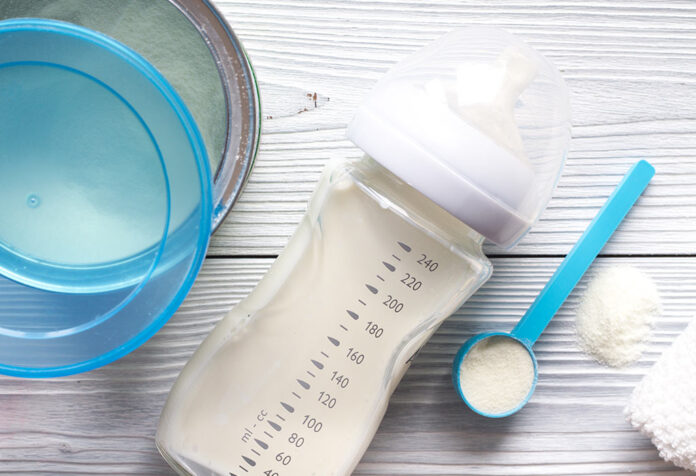
Feeding your baby can be a moment of bonding, a ritual of love. While breast milk is nature’s perfect baby food, sometimes mothers choose or need to rely on formula.
When that time comes, selecting the right formula for your baby is a paramount decision. Not every baby is the same; different babies have varied nutritional needs.
This guide will navigate the intricate factors parents should consider when determining the best formula for their bundle of joy.
Types of Baby Formula
The baby formula aisle can be overwhelming, with numerous types available. The three main categories are:
- Cow’s milk-based formula ─ The most common and suitable for most babies. It’s formulated to be closest to breast milk in composition.
- Soy-based formula ─ A vegan-friendly choice that’s ideal for babies who can’t tolerate lactose or for families with certain dietary preferences.
- Hypoallergenic formula ─ Designed for babies with allergies or a high risk of them. These formulas break down proteins into simpler forms to prevent allergic reactions.
Choosing the right one depends on your baby’s health, digestive comfort, and any allergies.
Age-Appropriate Formulas

A baby’s nutritional needs evolve. Thus, formulas are tailored to different age brackets:
- Infant formula ─ Ideal for newborns up to 12 months, catering to rapid growth.
- Follow-up formula ─ For babies 6-12 months, complementing an increasing solid food diet.
- Toddler formula ─ Post 12 months, for toddlers who aren’t keen on cow’s milk yet.
Each type ensures that the baby receives the right nutrients for their development stage.
Nutritional Requirements
Every sip counts in a baby’s meal. Key nutritional components to scout for in baby formula such as The Milky Box include:
- Protein and fat ─ Vital for growth and brain development. Fat also provides the necessary calories.
- Carbohydrates ─ Mainly lactose, providing energy.
- Vitamins and minerals ─ Essential for bone growth, brain health, and overall development.
While the exact intake varies per age, always check labels to ensure balanced nutrition.
Allergies and Sensitivities
It’s heartbreaking to see your baby uncomfortable. Some infants have allergies or sensitivities to certain formula ingredients. Common culprits include lactose or cow’s milk protein. If your baby shows signs like excessive crying, gas, or rashes after feeding, hypoallergenic or lactose-free formulas might be the answer.
Baby’s Health Considerations

Every baby is unique. Some might have special health considerations:
- Premature babies ─ Require formulas with added nutrients.
- Reflux ─ Thickened formulas can help.
- Metabolic disorders ─ Demand specialized formulas.
It’s crucial to align the formula choice with your baby’s specific health needs.
Organic and Non-GMO Options
For eco-conscious parents, organic and non-GMO formulas are increasingly becoming a go-to choice. These formulas offer peace of mind as they’re meticulously cultivated without the use of harmful pesticides, herbicides, or genetically modified organisms, ensuring a natural start for your baby.
Moreover, they often boast a richer nutrient profile compared to conventional formulas. While many see organic and non-GMO options as purer and more wholesome, there’s a cost consideration. These formulas tend to be pricier due to stringent farming and production practices. Before opting for them, it’s crucial to weigh the evident benefits against the potential financial strain and ensure that the chosen brand is readily available in your region.
Formula Preparation and Safety
Ensuring your baby’s health extends beyond just selecting the right formula; its proper preparation is non-negotiable. Formula, when incorrectly prepared, can either lack essential nutrients or prove harmful. Always adhere to manufacturer instructions meticulously. Prioritize using clean, sterilized bottles and teats to prevent bacterial contamination.
The water-to-formula ratio is crucial – too much water, and your baby might miss out on vital nutrients; too little, and it might strain their developing digestive system. Once opened, formula cans should be tightly sealed and stored away from direct sunlight in a cool, dry place to maintain freshness. Always prioritize your baby’s safety in every feeding step.
Formula Brands and Reviews

The baby formula market is diverse, with a multitude of brands like Enfamil, Similac, Gerber, and many others vying for parents’ trust. Each brand promises optimal nutrition, but their formulations might vary. To make an informed decision, it’s imperative to not only research but also to compare ingredients, nutrient content, and sourcing practices.
Dive deep into parent reviews and testimonials – real-life experiences offer a wealth of insight. Sometimes, determining the best fit for your baby might involve some trial and error. Different babies react differently, and while one brand might be a favorite for one, another could be ideal for your child.
Consulting a Pediatrician
The path to nurturing a healthy baby is often paved with numerous decisions, and expert advice can be invaluable. Pediatricians, with their vast experience and specialized training, are fountains of wisdom. They’ve encountered countless babies with varied needs and can provide tailored guidance based on your baby’s specific health and nutritional requirements.
Whether it’s about addressing a potential allergy, understanding a formula’s composition, or gauging its suitability, your pediatrician’s input is golden. Before settling on or switching a formula, always consult with them to ensure you’re making the best choice for your baby’s well-being.
Transitioning to Solid Foods
Moving from formula or breast milk to solids is not just a dietary change but a significant developmental milestone in your baby’s life. Typically, the introduction starts around the 6-month mark, signaling a new phase of exploration and discovery. Nutritionists and pediatricians often recommend beginning with iron-fortified single-grain cereals to ensure they meet their iron needs.
Once your baby adapts, you can gradually introduce pureed veggies, followed by fruits and eventually meat. This gradual transition helps in identifying any allergies or intolerances. But it’s vital to remember that during this transition phase, formula or breast milk remains their primary nutrition source until the first birthday, providing the essential nutrients for growth and development.

Conclusion and Recap
Choosing the right baby formula is an amalgamation of science, love, and care. Whether you’re eyeing the organic aisle, tackling allergies, or simply seeking the best nutritional blend, always remember that every baby is unique. Prioritize their well-being, consult experts, and trust your instincts. After all, in the quest for the perfect formula, love is the most essential ingredient.






